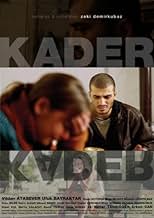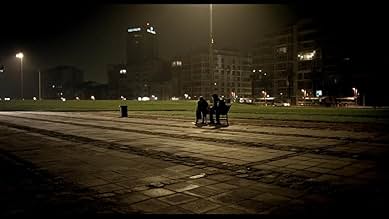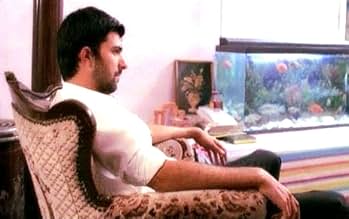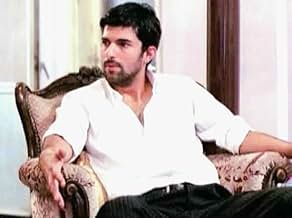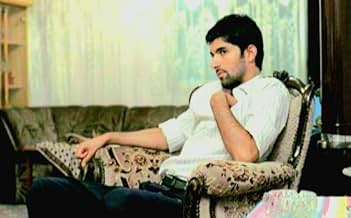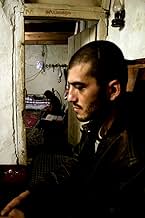Kader
- 2006
- 1h 43min
PUNTUACIÓN EN IMDb
7,7/10
19 mil
TU PUNTUACIÓN
Bekir ama a Ugur, que ama a Zagor, que ama cometer crímenes.Bekir ama a Ugur, que ama a Zagor, que ama cometer crímenes.Bekir ama a Ugur, que ama a Zagor, que ama cometer crímenes.
- Dirección
- Guión
- Reparto principal
- Premios
- 10 premios y 9 nominaciones en total
Apo Demirkubuz
- Muzo
- (as Abdullah Demirkubuz)
Reseñas destacadas
Zeki Demirkubuz has his personal cinema aspect as the other legends and this view makes this movie the unique movie in the History of Turkish Cinema.
The leading role is the most important role in this movie because of his ability of show how normal Turkish guys love.
Also the movie show us how can a man ruin his and his family's life. The issue looks like ordinary,simple and routine but the director shows how important issue it is. Camera views , sound , dialogs are great Zeki Demirkubuz will be a legend in a few years. Original, different, extraordinary, must see..
The leading role is the most important role in this movie because of his ability of show how normal Turkish guys love.
Also the movie show us how can a man ruin his and his family's life. The issue looks like ordinary,simple and routine but the director shows how important issue it is. Camera views , sound , dialogs are great Zeki Demirkubuz will be a legend in a few years. Original, different, extraordinary, must see..
Conceived as a prequel to MASUMİYET (1997), KADER (DESTINY) focuses on an impossible love-affair between Bekir (Ufuk Bayraktar) and Uğur (Vildan Atasever) that begins in the seedier areas of Beyoğlu in İstanbul and remains unfinished in the snowy wastes of Kars in the east of the Republic of Turkey.
The sentiments expressed are redolent of the Yeşilçam melodramas that hitherto have formed a backdrop to many of Demirkubuz's movies. Bekir leaves his wife Emine (Güzin Alkan) and children on at least two occasions to pursue Uğur all around the country, despite the hopelessness of his quest. Uğur remains in love with habitual criminal Zagor (Ozan Bilen), who is transferred from prison to prison following a series of attacks on police officers, wardens and fellow inmates. Uğur keeps telling Bekir to go home, but he keeps reappearing in her life at the most inopportune moments; in the Black Sea port of Sinop, for example, she is evicted from her hotel room as Bekir clamors to see her. The ill-matched couple finally fetch up at a mud-brick house in Kars; nothing is resolved (which subverts the Yeşilçam convention).
Demirkubuz invests this story with gritty social realism. Uğur grows up in a violent environment where women are routinely treated as sex-objects with little power of self-determination. She cannot quite grasp the fact that Bekir lacks the outward strength to conform to her expectations of all men. Bekir likes to exchange sex-talk with his male friends, but hardly conforms to the image of masculinity that prevails in his immediate surroundings, that is based on power and aggression. It is the kind of world where Uğur's mother's boyfriend Cevat (Engin Akyürek) is knifed to death in a kıraathane (coffee-house), simply for causing an argument.
In this kind of environment where such feelings as love and tenderness mean nothing, it's hardly surprising that the central love-affair remains unfulfilled. Bekir must shoulder some of the blame for this; at one point he vividly describes how he made love to Uğur on the first occasion they met. In truth he was almost embarrassed in her presence, unable to speak or communicate properly and falling in love with her photograph. Yet the admission of such emotions is considered "unmanly," something that Bekir is keen to avoid.
On at least three occasions the protagonists refer to destiny directing their lives: Uğur cannot help but pursue Zagor, despite his propensity for being imprisoned, while Bekir cannot avoid pursuing Uğur all round the country, even if by doing so he enters "another world," in which marriage, home and family (the traditional symbols of social and moral stability) no longer matter. We might disagree with the protagonists' analysis - to a large extent their decisions are made of their own free will - but we nonetheless understand quite tangibly how their characters have been shaped by the harsh environment in which they have grown up. This is the fundamental socio-economic point that KADER makes; if the families showed more concern for their members and their collective futures, then perhaps the world might be a less unforgiving place.
The sentiments expressed are redolent of the Yeşilçam melodramas that hitherto have formed a backdrop to many of Demirkubuz's movies. Bekir leaves his wife Emine (Güzin Alkan) and children on at least two occasions to pursue Uğur all around the country, despite the hopelessness of his quest. Uğur remains in love with habitual criminal Zagor (Ozan Bilen), who is transferred from prison to prison following a series of attacks on police officers, wardens and fellow inmates. Uğur keeps telling Bekir to go home, but he keeps reappearing in her life at the most inopportune moments; in the Black Sea port of Sinop, for example, she is evicted from her hotel room as Bekir clamors to see her. The ill-matched couple finally fetch up at a mud-brick house in Kars; nothing is resolved (which subverts the Yeşilçam convention).
Demirkubuz invests this story with gritty social realism. Uğur grows up in a violent environment where women are routinely treated as sex-objects with little power of self-determination. She cannot quite grasp the fact that Bekir lacks the outward strength to conform to her expectations of all men. Bekir likes to exchange sex-talk with his male friends, but hardly conforms to the image of masculinity that prevails in his immediate surroundings, that is based on power and aggression. It is the kind of world where Uğur's mother's boyfriend Cevat (Engin Akyürek) is knifed to death in a kıraathane (coffee-house), simply for causing an argument.
In this kind of environment where such feelings as love and tenderness mean nothing, it's hardly surprising that the central love-affair remains unfulfilled. Bekir must shoulder some of the blame for this; at one point he vividly describes how he made love to Uğur on the first occasion they met. In truth he was almost embarrassed in her presence, unable to speak or communicate properly and falling in love with her photograph. Yet the admission of such emotions is considered "unmanly," something that Bekir is keen to avoid.
On at least three occasions the protagonists refer to destiny directing their lives: Uğur cannot help but pursue Zagor, despite his propensity for being imprisoned, while Bekir cannot avoid pursuing Uğur all round the country, even if by doing so he enters "another world," in which marriage, home and family (the traditional symbols of social and moral stability) no longer matter. We might disagree with the protagonists' analysis - to a large extent their decisions are made of their own free will - but we nonetheless understand quite tangibly how their characters have been shaped by the harsh environment in which they have grown up. This is the fundamental socio-economic point that KADER makes; if the families showed more concern for their members and their collective futures, then perhaps the world might be a less unforgiving place.
10godard78
i am the one who can have a chance to attend 43. Antalya Golden Orange Film Festival since my short film was in the competition.i have watched climates,a mans fear of god,destiny and waiting for a heaven .i see that Turkish films are extremely universal and the directors styles are really going better both in technical way and art stuff.but "Destiny" , Zeki Demirkubuz's last film, absolutely deserved the "best film award" and got it.Destiny's Screenplay and Realistic Dialogs with violence and crime also Ufuk Bayraktar's starring are the most dominating factors for movie to be best."Destiny" is the best film of Demirkubuz and i believe he will be recognized more and supported so much by Turkish people since its style of directing and filmography is considered as a new-time Yilmaz Guney. Pay attention to the doors and the lights on the mirror,"Destiny" has a lot to say that we should think over.
Imagine a film, that makes you feel the hardness of the pavement you hit your head onto, once again. Imagine a film, the only thing you can do after leaving the cinema is shutting up your mouth. Imagine a film, that tells you the inside world of the taxi driver who is driving you home or to work.
This is thematic continuation of Masumiyet, but more in the flashback mode and hits much powerful than Masumiyet, although with a less experienced cast. The story tells us how the love of Bekir and Ugur (continued characters in Masumiyet) began, and the surroundings of them in their youth. But ! this is the apparent, the easily visible part of that film! The more important thematic gem, is the surroundings of these two characters, which appropriately fits the living-cultural-social conditions of the big populated suburbs of big cities of Turkey. This is not a documentary and not a love story with its simplest meaning and it is not realism; it is the reality itself. It's bone hard, that pulls you into the living of the 'damned', as termed by the bourgeois or religious jargon. The acting is, though Vildan Atasever got so much negative critics (my opinion, she is the leading cast, a very talented artist) superb. Keep also in mind that certain camera angels in very small locations are used masterfully. The story: do not look to the apparent love story going on ! Try to understand those circumstances and those people. People live the lives of conditions they are born into. It is a everyday news here in Turkey, that some people kill some other for not any reason that could be put into the borders of "western rationality". The best explaining word for this movie is a German word: Knallhart ! (not implying the film knallhart-2006 in any way) translated as tough enough, but which explains a more dramatic condition. That film is a real Knallhart of the last few years not only in the name of Turkish movie making. You can observe these lives in Barcelona, Rome, Berlin, and maybe all Latin America. For those watching this film with translation, either dubbed or subbed, many of the dialogs, i guess, will be more softly pronounced. Linguistic is the heart of a culture. And, Demirkubuz made his masterpiece by pulling out the heart of the streets of its shell and bringing it to the world of cinema. There is a world going on with very simple rules, when you are asleep.
and finally some trivial: Demirkubuz's 2001 movie Yazgi means also destiny or fate.
This is thematic continuation of Masumiyet, but more in the flashback mode and hits much powerful than Masumiyet, although with a less experienced cast. The story tells us how the love of Bekir and Ugur (continued characters in Masumiyet) began, and the surroundings of them in their youth. But ! this is the apparent, the easily visible part of that film! The more important thematic gem, is the surroundings of these two characters, which appropriately fits the living-cultural-social conditions of the big populated suburbs of big cities of Turkey. This is not a documentary and not a love story with its simplest meaning and it is not realism; it is the reality itself. It's bone hard, that pulls you into the living of the 'damned', as termed by the bourgeois or religious jargon. The acting is, though Vildan Atasever got so much negative critics (my opinion, she is the leading cast, a very talented artist) superb. Keep also in mind that certain camera angels in very small locations are used masterfully. The story: do not look to the apparent love story going on ! Try to understand those circumstances and those people. People live the lives of conditions they are born into. It is a everyday news here in Turkey, that some people kill some other for not any reason that could be put into the borders of "western rationality". The best explaining word for this movie is a German word: Knallhart ! (not implying the film knallhart-2006 in any way) translated as tough enough, but which explains a more dramatic condition. That film is a real Knallhart of the last few years not only in the name of Turkish movie making. You can observe these lives in Barcelona, Rome, Berlin, and maybe all Latin America. For those watching this film with translation, either dubbed or subbed, many of the dialogs, i guess, will be more softly pronounced. Linguistic is the heart of a culture. And, Demirkubuz made his masterpiece by pulling out the heart of the streets of its shell and bringing it to the world of cinema. There is a world going on with very simple rules, when you are asleep.
and finally some trivial: Demirkubuz's 2001 movie Yazgi means also destiny or fate.
Bekir is married,has two kids.But he loves Ugur,he goes wherever she goes.Ugur is a bar singer,she loves Zagor,she goes wherever Zagor goes.Zagor is a cop killer,he visits prisons all over in Turkey.An endless story about two lovers...
A great story written,photographed and directed by Zeki Demirkubuz.Well acted at the same time.Vildan Atasever as Ugur.Now one of the most talented actresses in Turkey.And especially Ufuk Bayraktar as Bekir.Watching his change in the role is really fascinating.The movie,the cast and the crew everyone deserved the Altin Portakal.Congratulations...
A great story written,photographed and directed by Zeki Demirkubuz.Well acted at the same time.Vildan Atasever as Ugur.Now one of the most talented actresses in Turkey.And especially Ufuk Bayraktar as Bekir.Watching his change in the role is really fascinating.The movie,the cast and the crew everyone deserved the Altin Portakal.Congratulations...
¿Sabías que...?
- CuriosidadesIn the first scene of Irfan's hotel, Bekir salutes Irfan and they watch Masumiyet (1997) on TV, which is sequel of this movie. In a way, Bekir witnesses his future with Ugur.
- PifiasWhile Bekir is cutting Ugur's photo the tea glass is nearly empty, but then he looks in the photo he cut and half of the glass is full.
- ConexionesFollows Masumiyet (1997)
- Banda sonoraMeditations
Written and performed by Eduard Artemyev
Courtesy of Electroshock Records
Cleared by Rh Pozitif Publishing
Selecciones populares
Inicia sesión para calificar y añadir a tu lista para recibir recomendaciones personalizadas
- How long is Destiny?Con tecnología de Alexa
Detalles
Taquilla
- Recaudación en todo el mundo
- 122.904 US$
- Duración1 hora 43 minutos
- Color
- Mezcla de sonido
Contribuir a esta página
Sugerir un cambio o añadir el contenido que falta

Principal laguna de datos
By what name was Kader (2006) officially released in India in English?
Responde
